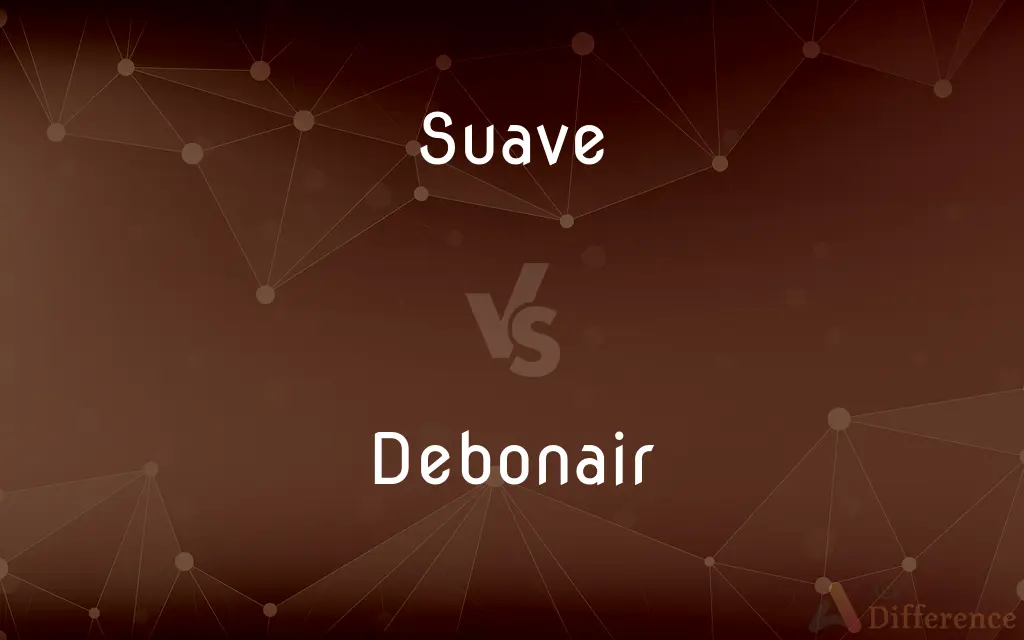Suave vs. Debonair — What's the Difference?
Edited by Tayyaba Rehman — By Maham Liaqat — Updated on May 6, 2024
Suave implies a smooth and agreeable manner often linked to charm and politeness, while debonair refers to a sophisticated, confident style and cheerful disposition.

Difference Between Suave and Debonair
Table of Contents
ADVERTISEMENT
Key Differences
Suave is often associated with a smoothness in social interactions, suggesting a polished and gracious demeanor. In contrast, debonair connotes not just sophistication but also an effortless elegance combined with a cheerful, carefree attitude.
Suave individuals might be admired for their diplomacy and tact in handling social situations, whereas debonair individuals are often celebrated for their light-hearted and perhaps more outwardly confident approach.
The suave persona may be seen as more reserved and calculating, aimed at leaving a favorable impression, while the debonair character is typically perceived as more spontaneous and overtly friendly.
In terms of appearance, suave might suggest a refined, perhaps understated elegance, whereas debonair often includes a more dashing and noticeable stylishness.
Both qualities are desirable in social settings, but suave might be more about smoothness in communication, while debonair emphasizes a lively charm.
ADVERTISEMENT
Comparison Chart
Definition
Smooth and agreeable in manner
Sophisticated, confident, and cheerful
Key Traits
Polished, tactful, diplomatic
Stylish, cheerful, spontaneous
Social Perception
Reserved, calculating
Outgoing, friendly
Style Implication
Understated elegance
Noticeable stylishness
Typical Contexts
Diplomatic meetings, negotiations
Social gatherings, public appearances
Compare with Definitions
Suave
Sophisticated without aggressiveness.
His suave approach in negotiations won him many contracts.
Debonair
Confident, stylish, and charming.
His debonair presence at the party turned heads.
Suave
Charmingly polite and elegant.
His suave manner made him popular among colleagues.
Debonair
Cheerful and carefree in demeanor.
His debonair smile made him instantly likable.
Suave
Reflecting smoothness in behavior and style.
He was suave in his attire and speech at the gala.
Debonair
Marked by a nonchalant elegance.
He wore his jacket with a debonair flair.
Suave
Smoothly agreeable and courteous.
He handled the tense meeting with a suave diplomacy.
Debonair
Effortlessly stylish and lively.
The debonair actor charmed his audience with ease.
Suave
Polished in texture and appearance.
The suave texture of the silk suit complemented his polished look.
Debonair
Graceful and attractive in appearance and manner.
His debonair approach to life inspired his friends.
Suave
Suave is a brand name based in Chicago, Illinois, used by the Unilever company in the United States, Argentina, Brazil, Mexico and Canada. Targeting discount stores, the brand represents more than 100 products including shampoo, lotions, soaps and deodorant.
Debonair
(of a man) confident, stylish, and charming
All the men looked debonair and handsome in white tie and tails
Suave
Courteous and elegant; gracious and sophisticated.
Debonair
Sophisticated; urbane.
Suave
Charming, confident and elegant.
A man with a suave demeanor
Debonair
Gracious and charming in a cheerful, carefree way.
Suave
Sweet talk.
Debonair
(obsolete) Gracious, courteous.
Suave
Sweet; pleasant; delightful; gracious or agreeable in manner; bland.
Debonair
Suave, urbane and sophisticated.
Suave
Having a sophisticated charm;
A debonair gentleman
Debonair
(especially of men) Charming, confident, and carefully dressed.
Suave
Smoothly agreeable and courteous with a degree of sophistication;
He was too politic to quarrel with so important a personage
The hostess averted a confrontation between two guests with a diplomatic change of subject
The manager pacified the customer with a smooth apology for the error
Affable, suave, moderate men...smugly convinced of their respectability
Debonair
(obsolete) Debonaire behaviour; graciousness.
Debonair
Characterized by courteousness, affability, or gentleness; of good appearance and manners; graceful; complaisant.
Was never prince so meek and debonair.
Debonair
Having a sophisticated charm;
A debonair gentleman
Debonair
Having a cheerful, lively, and self-confident air;
Looking chipper, like a man...diverted by his own wit
Life that is gay, brisk, and debonair
Walked with a jaunty step
A jaunty optimist
Common Curiosities
What primarily distinguishes a suave person from a debonair one?
A suave person is primarily characterized by smoothness and tactfulness, while a debonair person emphasizes a joyful confidence and style.
Which term is more related to fashion?
Debonair is more directly related to fashion and style, often implying a noticeable stylishness.
Can women be described as suave or debonair?
Yes, both terms can describe women, with suave focusing on elegance and smoothness, and debonair on confident cheerfulness.
Is being debonair better than being suave?
Neither is inherently better; it depends on the context and personal preference for either reserved smoothness (suave) or cheerful confidence (debonair).
What are common synonyms for suave and debonair?
Common synonyms for suave include smooth and polished, while synonyms for debonair include dashing and charming.
Do these terms have any negative connotations?
While generally positive, suave can sometimes imply a manipulative smoothness, and debonair might be viewed as superficial in some contexts.
How can someone develop a suave or debonair personality?
Developing a suave personality involves mastering tact and diplomacy, while adopting a debonair persona might focus on cultivating an outgoing and stylish confidence.
What historical figures are often described as suave?
Cary Grant is a classic example of a suave individual due to his polished and sophisticated demeanor.
Are these traits innate or can they be learned?
Both traits can be cultivated, though some individuals might naturally lean towards one due to their personality.
How do cultural perceptions of these traits differ?
Cultural perceptions can vary; in some cultures, suave traits may be more valued in professional settings, whereas debonair traits might be preferred in social settings.
Share Your Discovery

Previous Comparison
Snob vs. Snot
Next Comparison
Hidalgo vs. NobilityAuthor Spotlight
Written by
Maham LiaqatEdited by
Tayyaba RehmanTayyaba Rehman is a distinguished writer, currently serving as a primary contributor to askdifference.com. As a researcher in semantics and etymology, Tayyaba's passion for the complexity of languages and their distinctions has found a perfect home on the platform. Tayyaba delves into the intricacies of language, distinguishing between commonly confused words and phrases, thereby providing clarity for readers worldwide.
















































